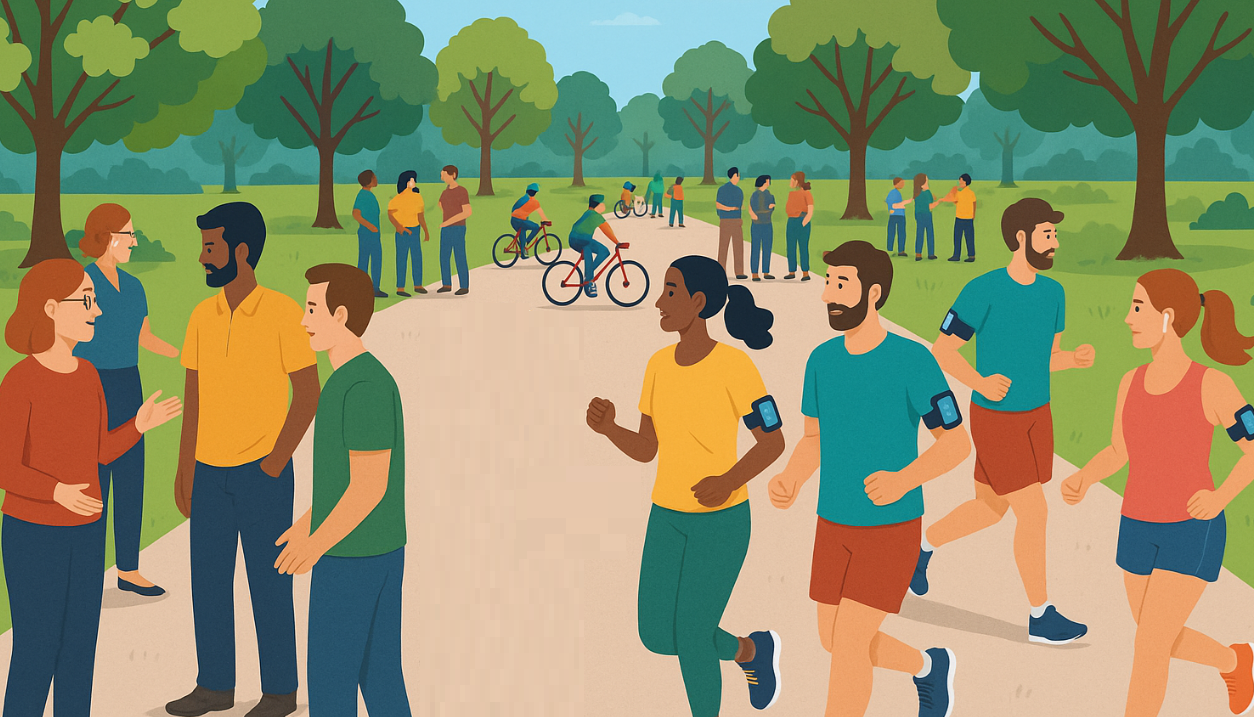IEEE Bigdata 2025 Special Session
SMD II: Synergizing Mobility Data for Human Life Evolution in Real Spaces

illustrated by ChatGPT-4.
Links
The corresponding page on the site of IEEE Bigdata 2025 The Web page of IEEE Bigdata 2025Scope
The mutual interaction - not limited to the liveliness or activeness - of people fosters the cross-over evolution which enhances the prosperity of the local society which can grow to make a life space preferable to live and work in.
Here, succeeding the session of last year "Synergizing Mobility Data for Creating and Discovering Valuable Places" dedicated to the open problem to discover such a place, we run the above session to challenge the aim to realize an evolving society. The central focus here is the humans - each individual and the interaction of individuals gather in the real space. For example, we may learn a lot from words of others talking behind you and aside you, even when you are reading answers to your question to a generative AI agent. This effect may be influenced by the width of the space, and the howling of the voices in a room, which are the features of a life space. As in the last year, we stand on the belief that a valued place is the basis of the sustainable prosperity of human society, where a lively society with active markets is created via the synergetic interaction of individuals, observed as activities involving movements, communication, and exchange of values and information.
A point we raise is that the information useful for fostering the cross-over and mutation of human lives and ideas/styles for human lives, via social interactions in real spaces, can be beyond sheer "mobility data" which is the digitalization of the log of human movements. We should involve data on the words, thoughts, or health of humans, and on social or natural environment such as location, weather, etc., which may work to trigger, change, or sustain the emotions and activities of humans via effects that may have been invisible or undetected so far. The authors are welcome to show approaches for obtaining or combining such useful data and using the data for discovering the signs of evolutions and forecasting or fostering the evolutions too.
Relevant areas
- We would like to have papers and presentations about methods or theories for creating, collecting, combining, or utilizing data on the activities of humans and relevant events, so that spaces and communities embracing the potential of evolution can be discovered. In comparison with last year, where the target was "places," this year we focus on "human life evolution" and which converts a space into a place and a place into a social environment. We call for presentations relevant to, but not restricted (as far as it is relevant to our interest above) to the four scopes below.
- [Analysis: Activities and interactions of humans]
- Analysis of data on mobility, communication, thoughts, and all other activities and events relevant to humans; Evaluation of walkability; Explanation of group activities with running, cycling, talking, eating, etc.; Explanation of infectious disease expansion, Prediction of crimes, etc.
- [Synthesis: Utility of big data for making places]
- Place-making strategies with big data; Participatory design; Environmental psychology; Smart cities and technologies; Placemaking for creative thinking and communication; Sustainable design practices; Interventions for improving human-life quality
- [Data Science]
- Fundamental methods and methodologies for data Integration, statistical analysis, machine learning, and predictive Modeling; Data visualization for creative systems design; Ethics and privacy; Chance (risks and opportunities in an dynamic environment with uncertainty) discovery
- [Data Society]
- Creation and circulation of values from data; Monetization of data on mobility and other data to be combined; Product/service development to enhance well-being in places; Partnerships and collaborations; Regulatory compliance and risk management
Important Dates
- Paper submission: October 14, 2025: strict
- Notification of acceptance: November 4, 2025
- Camera-ready paper due: November 14, 2025 : strict
- Paper submission: PDF in a 2-column IEEE format. Find instructions on:
- Jump to paper submission (https://wi-lab.com/cyberchair/2025/bigdata25/scripts/ws_submit.php?subarea=SP)
- Accepted papers will be published in conference proceedings from IEEE. All accepted papers must be presented by one of the authors. If you have any questions, please do not hesitate to contact info@panda.sys.t.u-tokyo.ac.jp .
Organizing Committee Members

The portraits of co-chairs in IEEE BigData 2024
- Ohsawa, Yukio (chair): University of Tokyo, Japan
- Kondo, Sae (co-chair: session originator): Mie University, and RCAST in The University of Tokyo, Japan
- Koshizuka, Noboru (co-chair): The Univ. of Tokyo, Japan
- Agrawal, Jitendra: Bristol University, UK
- Bandini, Stefania: University of Milano-Bicocca, Italy
- Bewong, Michael: Charles Sturt University, Australia
- Correa da Silva, Flavio:Universidade de Sao Paulo, Brazil
- Fruchter, Renate: Stanford University, USA
- Jugulum, Rajesh: Northeastern University, USA
- Nishinari, Katsuhiro: University of Tokyo, Japan
- Sekiguchi, Kaira: University of Tokyo, Japan
- Van den Poel, Dirk: Ghent University, Belgium